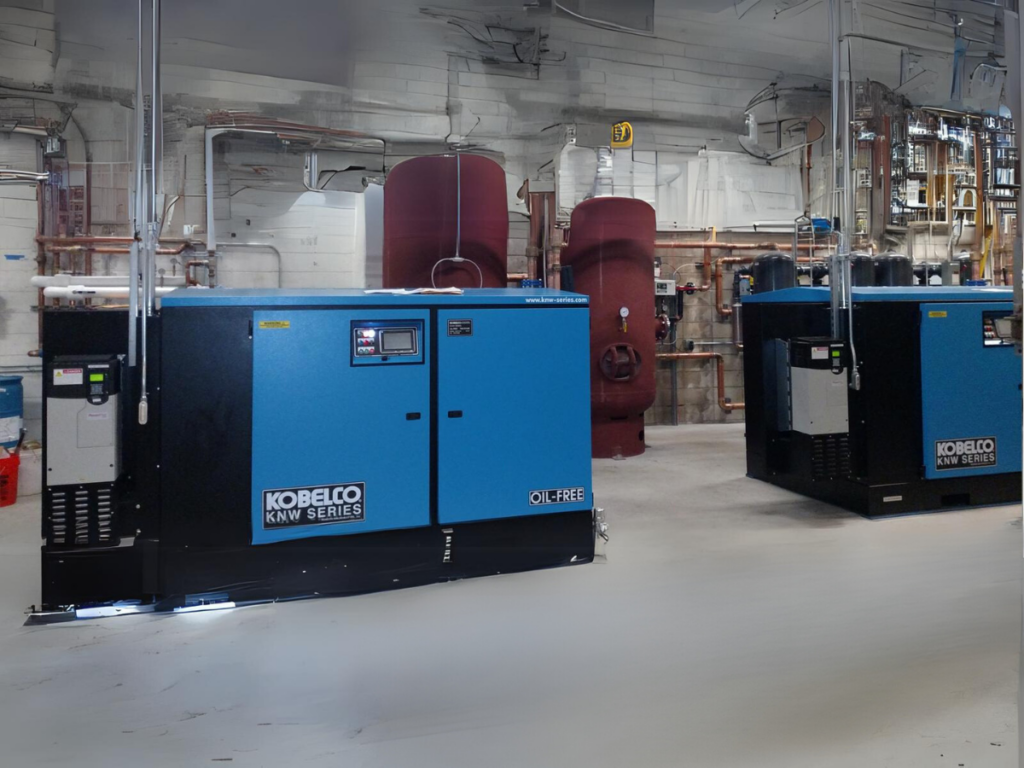Oil-Free and Oil-Less Air Compressors Support Sustainability
While oil-free and oil-less air compressors were traditionally adopted by industries that require the purest compressed air to ensure quality and safety in sensitive products, it turns out going oil free air can help all manufacturers reach green initiatives and sustainability goals, as oil-free and oil-less compressors minimize oil waste and energy usage to help reduce a facility’s carbon footprint.

Air Compression Technologies Explained
Before this blog addresses the environmental benefits of going oil free, it’s important to understand the difference between traditional, oil-free and oil-less air compression technologies:
| Traditional air compressors | or oil-lubricated air compressors, rely on lubricating oil to seal, cool and lubricate internal components. While they can be found throughout the industrial sector where they power tools and equipment and may be used in the manufacturing process, they do have the potential to introduce oil contamination into the compressed air stream. For this reason, applications that require the purest, cleanest air, such as food and beverage, medical device, pharmaceutical and electronics manufacturing, often forgo oil-lubricated air compressors and instead rely on oil-free or oil-less technologies to ensure the highest air quality and avoid contamination that can negatively affect product quality. |
| Oil-free air compressors | do not use any oil within the compression chamber. Instead, some versions of this specialized air compressor type use alternative materials such as water or Teflon to protect components while allowing them to move smoothly without the use of oil-based or synthetic lubricants. Other oil-free compressor designs have completely removed metal-to-metal contact from the compression chamber, eliminating the need for any lubrication at all. It should be noted that in some oil-free models, the bearings and gears within the gearbox will still require lubrication; however, this is external to the compression chamber and proper sealing of the gearbox ensures that oil will not contaminate the delivered compressed air. |
| Oil-less air compressors | have no oil present in the compression package. While oil-less compressors do decrease the risk of contamination, they work by first ingesting ambient air, filtering the air to eliminate particulate contamination and then pressurizing and cooling the air for use. It is important to make sure the intake air is free of any oil vapors, hydrocarbons or other hazardous substances. |
Going Oil Free Supports Green Initiatives
As discussed above, oil-free and oil-less air compressors, which either completely forgo the use of lubricant or seal a lesser quantity of lubricant tightly within a gearbox so it does not contact the compressed air chamber, were initially introduced to serve industries that require very pure compressed air in order to avoid introducing oil contamination into the compressed air stream and prevent damage to finished products.
But an advantageous side effect of oil-free or oil-less technologies is that the lack of oil (or the reduced quantity of lubricant) makes these specialized air compression technologies inherently more environmentally friendly. As a result, oil-free and oil-less air compressors are currently growing in popularity as the green movement gains traction in the manufacturing industry. Here’s why:
- Reduced Oil Waste: Eliminating or reducing the amount of lubricating oil through the use of oil-free or oil-less air compressors results in less oil waste as there is either no need to change and replace the oil or there is significantly less oil to change, which reduces the environmental impact (and costs) associated with disposing of used oil. In addition, there is no risk of oil leaks or spills, which are environmentally unfriendly and typically require regulated waste management and clean up. Further, the byproduct of compressing air in a traditional air compressor is condensate, which can become contaminated with oil in oil-lubricated air compressors. Generated condensate requires treatment to separate oil from the condensate water for proper disposal. However, oil-free and oil-less technologies eliminate this issue to provide a cleaner, greener alternative to traditional, oil-lubricated air compression technologies.
- Improved Air Quality: Air quality is also improved as oil-free and oil-less air compression technologies do not use oil and, therefore, do not release oil contaminants or other hazardous substances into the air, making them a more environmentally friendly option.
- Minimized Energy Usage: Lower energy use is another potential benefit of oil-free and oil-less air compressors because these technologies compress air in a different manner which can minimize energy usage during the compression process. Furthermore, oil-free and oil-less air compressors do not need to increase force or pressure to circulate oil, significantly reducing energy requirements of the overall air compression system. Also, because oil-free compressors do not require filters to collect oil, these systems may experience less pressure drop and draw less energy to operate. Additionally, many newer oil-free and oil-less air compression systems offer advanced controls and options such as variable speed drives that allow users to maintain better control over energy use. Together, these characteristics reduce the use of electricity and improve a facility’s carbon footprint.
A Trusted Supplier
While oil-free and oil-less air compression technologies do support green initiatives by improving air quality, reducing the environmental risks associated with oil waste and minimizing energy usage, oil-free and oil-less air compressors differ in operation from traditional, oil-lubricated air compressors. For this reason, it’s important to work with a trusted supplier if you plan to go oil free to achieve purer, higher-quality compressed air and/or reach sustainability goals. In addition to traditional air compressors, JHFOSTER offers a complete line of oil-free and oil-less air compressors to fit any application. We have expertise and experience in the selection, installation and maintenance of oil-free and oil-less air compressors. To achieve highly pure air, while also reducing your facility’s environmental impact and carbon footprint via an oil-free or oil-less air compressor, please contact JHFOSTER today.